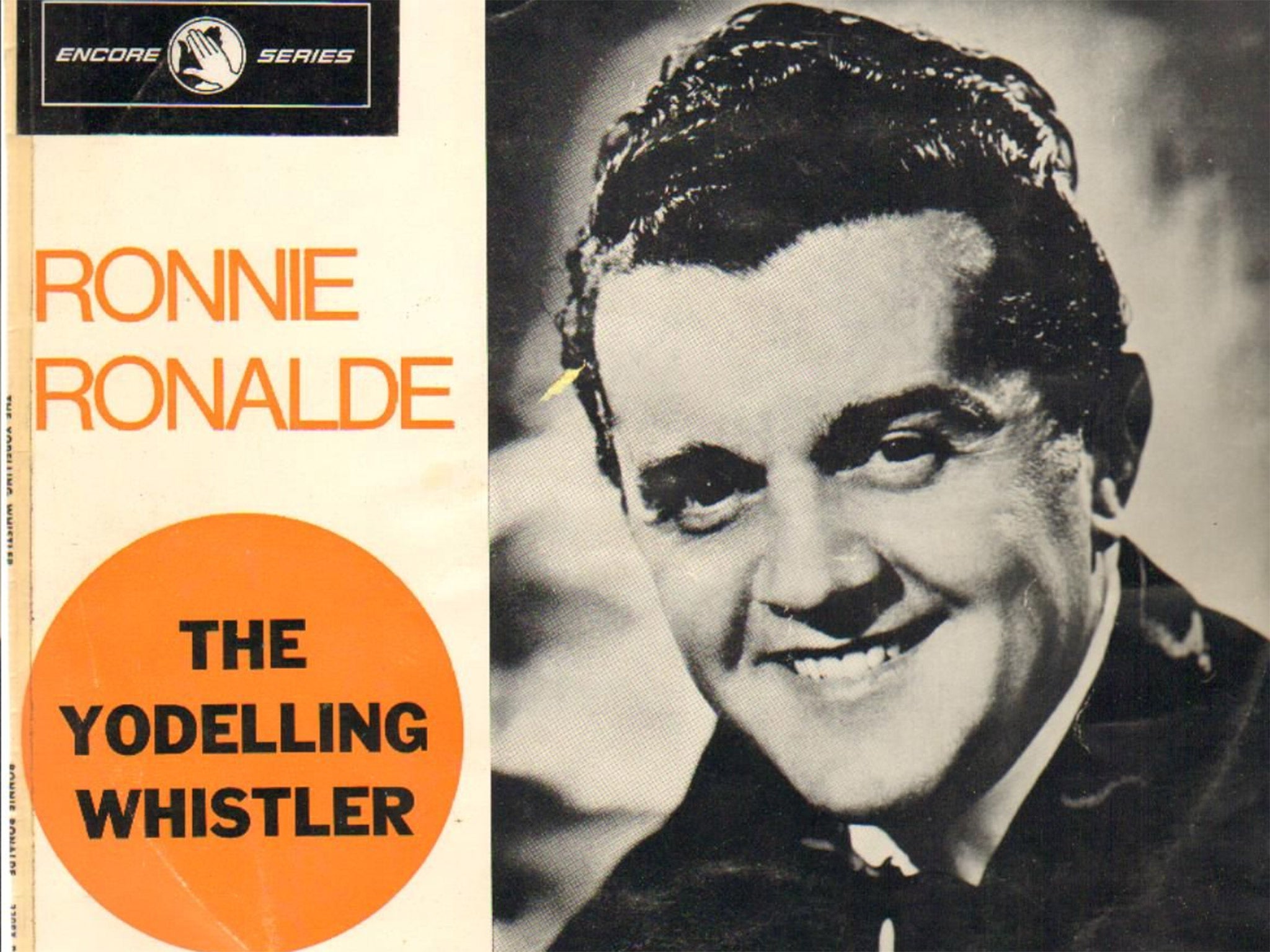Ronnie Ronalde: Music hall artiste famous for his whistling and yodelling
Ronalde was a major attraction on both sides of the Atlantic and audiences marvelled at lightning-fast versions of "Tritsch Tratsch Polka" and "Can-Can"

Your support helps us to tell the story
From reproductive rights to climate change to Big Tech, The Independent is on the ground when the story is developing. Whether it's investigating the financials of Elon Musk's pro-Trump PAC or producing our latest documentary, 'The A Word', which shines a light on the American women fighting for reproductive rights, we know how important it is to parse out the facts from the messaging.
At such a critical moment in US history, we need reporters on the ground. Your donation allows us to keep sending journalists to speak to both sides of the story.
The Independent is trusted by Americans across the entire political spectrum. And unlike many other quality news outlets, we choose not to lock Americans out of our reporting and analysis with paywalls. We believe quality journalism should be available to everyone, paid for by those who can afford it.
Your support makes all the difference.Whistling has become a casualty of modern life. In the postwar years, millions whistled while they worked: window-cleaners, builders, delivery boys and, of course, the seven dwarfs. Ronnie Ronalde was acclaimed as the best and most successful whistler in the world. He topped variety bills and every one of his records passed the old grey whistle test. Al Jolson told him, "You've got a good whistle there, sonny boy."
He was born Ronnie Waldron in the London borough of Islington in 1923. His father Charles was sometimes out of work and his mother Ann would play the piano in local pubs for a few shillings. Ronnie soon discovered that he could whistle effectively and he would join her, collecting tips in his school cap. He always knew he could enhance his pocket money by whistling in the street.
Ronnie was a bright boy and he took a clerical job when he was 14 but soon left to join Steffani's Silver Songsters, where he was singled out as "the Pink of Perfection". They toured the UK during the war and then Ronnie was conscripted for army service. After the war, Arturo Steffani disbanded his Songsters and offered to manage him, giving him a new name, Ronnie Ronalde. Ronalde studied singing in London and went to Switzerland to learn yodelling techniques.
In 1949 he caused a sensation when he appeared on a variety bill at Radio City Music Hall in New York for 10 weeks. At first he would appear just before Roy Rogers and Trigger, but his whistling caused the horse to urinate. Rogers told him that winning horses often had to be tested after racing so Ronalde could have a new career if he wished. On subsequent visits he met Jane Russell and Marilyn Monroe. Russell sat on his lap, stuck her fingers in his mouth and told him to whistle, and as Ronalde told me in 2000, "Marilyn Monroe said my whistle made her shiver, now why did it do that? It must be something spiritual, I think."
In 1950 the EMI record producer Norman Newell was in a pub on the Edgware Road when Ronalde performed "If I Were A Blackbird" on the radio. As the customers were silent as he performed, Newell realised that this could be a hit record. That and "In A Monastery Garden" became best-selling records and favourites on the BBC programme Housewives' Choice.
He recorded the songs of the day, singing and whistling his way through "Hair Of Gold, Eyes Of Blue" and "Mocking Bird Hill". He discussed bird song with the ornithologist Percy Edwards and when he recorded "Ballad Of Davy Crockett" he made sure that his choice of birds was right for the area. He could mimic flutes and violins, while his version of "I Believe" highlighted his commanding tenor voice.
In 1954 an imposter toured the Netherlands pretending he was Ronalde and borrowing money from elderly ladies, saying he was expecting a cheque from the BBC. The imposter was jailed for four years – but he must have had considerable talent to be impersonating Ronalde.
Ronalde was a major attraction and audiences marvelled at his lightning-fast versions of "Tritsch Tratsch Polka" and "Can-Can". He hosted variety series for the BBC and ITV, but in the late 1950s there was a decline in variety acts and he was seen as an anachronism. Undeterred, he bought a large hotel in Guernsey, which was very successful. He met his wife Rosemarie, on a holiday in Austria and they were married in 1961. They had three children and she later became his manager.
When the children were adults Ronnie and Rosemarie emigrated to New Zealand, where they called their house Whistler's Lodge. Ronnie's piano had belonged to Richard Tauber, who had been his favourite singer.
Ronalde came back to the UK in 1998 to promote his autobiography, Around The World On A Whistle, a publication which showed he had kept every variety bill and programme in which he was involved. He was an immensely smart, dapper man in a three-piece suit and bow tie: indeed, looking exactly how you would expect a variety star to look.
He started performing in the UK again, and in 2002 he even recorded a session for John Peel. He received a standing ovation for his one-man show at the Hackney Empire in 2012, but he had a stroke the following year and was admitted to the Water Rats' retirement home, Brinsworth House.
SPENCER LEIGH
Ronald Charles Waldron (Ronnie Ronalde), whistler: born Islington, London 29 June 1923; married 1961 Rosemarie (two daughters, one son); died Twickenham 13 January 2015.
Join our commenting forum
Join thought-provoking conversations, follow other Independent readers and see their replies
Comments